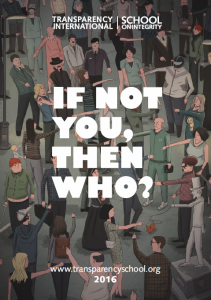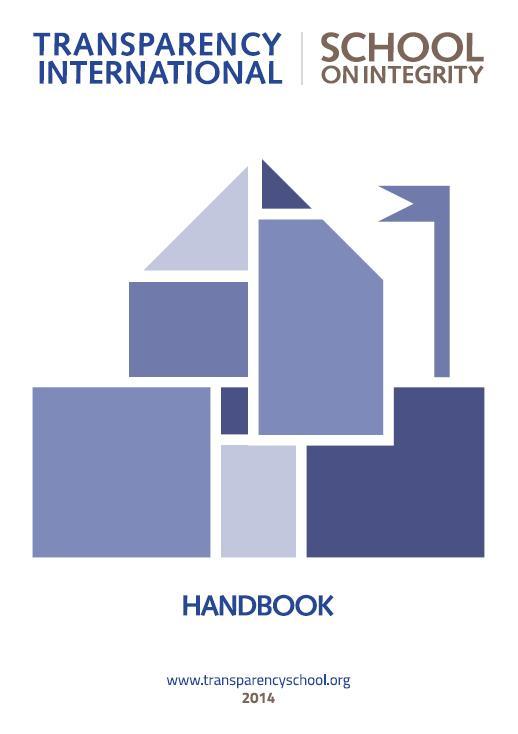PREPARATORY READING MATERIAL
1. United Nations Convention against Corruption
The Convention introduces a comprehensive set of standards, measures and rules that all countries can apply in order to strengthen their legal and regulatory regimes to fight corruption. It calls for preventative measures and the criminalization of the most prevalent forms of corruption in both public and private sectors, and requires Members States to return assets obtained through corruption to the country from which they were stolen.
You are further encouraged to take the initiative and familiarize yourself with the history and implementation of the Convention around the world: http://www.unodc.org/unodc/en/treaties/CAC/
2. The Anti-Corruption Plain Language Guide by Transparency International
The Anti-Corruption Plain Language Guide, developed by Transparency International, offers a set of standardised, easy-to-understand definitions, providing readers with concrete examples in practice of how TI approaches these issues. It aims to provide clarity on the terms that the anti-corruption movement uses most in its daily work as well as those associated with new and emerging issues. Relevant links are also provided for further backrgound information and research.
3. Corruption Perception Index
The Corruption Perceptions Index ranks countries and territories based on how corrupt their public sector is perceived to be. A country or territory’s score indicates the perceived level of public sector corruption on a scale of 0 – 100, where 0 means that a country is perceived as highly corrupt and 100 means it is perceived as very clean. A country’s rank indicates its position relative to the other countries and territories included in the index. This year’s index includes 177 countries and territories.
4. The Global Corruption Barometer 2017
The Transparency International Global Corruption Barometer is the largest cross-country survey collecting the views on and experiences of corruption of the general public. In 2010 and 2011, the Barometer interviewed more than 100’000 people in 100 countries, making it the most comprehensive round since the survey was launched in 2003. The Barometer explores the general public’s views about corruption levels in their country as well as their government’s efforts to fight corruption. The 2010/11 Barometer also probes the frequency of bribery, reasons for paying bribes in the past year and the attitudes towards the reporting of corruption incidents.
5. Bribe Payers’ Index
The Bribe Payers Index is a unique tool capturing the supply side of international bribery, specifically focusing on bribes paid by the private sector. It asks senior business executives in a number of countries around the world for their perceptions of the likelihood of companies, from countries they have business dealings with, to engage in bribery when doing business in the executive’s country.
Data for the Index is drawn from the Bribe Payers Survey – a country’s score is an average of the scores given by all the respondents who rated rated the country, resting on a 0-10 scale. A score of 0 corresponds with the perception that companies of that particular country always pay bribes when doing business abroad; a score of 10 indicates a perception that they never pay bribes in their ventures abroad.
6. Various global corruption reports: from education and access to information to private sector and political corruption
The Global Corruption Report (GCR) is one of Transparency International’s flagship publications, bringing the expertise of the anti-corruption movement to bear on a specific corruption issue. The report highlights cutting edge qualitative and quantitative research, gathers knowledge on lessons learned and showcases innovative tools. In doing so, it enhances our understanding of the dynamics of corruption and seeks to provide practical and proven solutions to improve governance and accountability.
7. OECD Convention on Combating Bribery of Foreign Public Officials in International Business Transactions: The OECD Anti-Bribery Convention establishes legally binding standards to criminalise bribery of foreign public officials in international business transactions and provides for a host of related measures that make this effective. It is the first and only international anti-corruption instrument focused on the ‘supply side’ of the bribery transaction. The 34 OECD member countries and six non-member countries – Argentina, Brazil, Bulgaria, Colombia, Russia, and South Africa – have adopted this Convention.
8. UN Global Compact’s ten principles
The UN Global Compact asks companies to embrace, support and enact, within their sphere of influence, a set of core values in the areas of human rights, labour standards, the environment and anti-corruption. Its ten principles in these areas enjoy universal consensus and are derived from major international treaties and agreements.
The 10th Principle states that businesses should work against corruption in all its forms, including extortion and bribery. You are encouraged to read further about it at
http://www.unglobalcompact.org/AboutTheGC/TheTenPrinciples/anti-corruption.html
9. Civil Law Convention on Corruption
The Civil Law Convention on Corruption, adopted by the Council of Europe on 4 November 1999, requires Member States to take measures at national level to provide for effective remedies for persons who have suffered damage as a result of acts of corruption, to enable them to defend their rights and interests, including the possibility of obtaining compensation for damage. The Convention contains provisions for international co-operation and monitoring action to ensure the aims above are met.
You are strongly encouraged to read the explanatory report to the Convention at http://conventions.coe.int/Treaty/en/Reports/Html/174.htm
10. Criminal Law Convention on Corruption
The Criminal Law Convention on Corruption, adopted by the Council of Europe on 27 January 1999, requires Member States to take measures at national level to criminalize and punish the conduct of bribery, trading in influence, money laundering (of proceeds from corruption offences) and all related account offences. Due to the nature of the Convention, it contains further provisions for international co-operation and compliance to ensure effective enforcement across borders. It is notable that the Convention contains provisions for holding legal persons accountable in certain cases for the criminal offences listed above committed by natural persons occupying leading positions in those legal entities.
The Convention also requires Member States to enact provisions for the protection of witnesses to these acts and collaborators of justice (known colloquially as “whistleblowers”).
You are strongly encouraged to read the explanatory report to the Convention at http://conventions.coe.int/Treaty/en/Reports/Html/191.htm
We also strongly recommend that you have a look at the pages below:
http://transparency.org/
http://corruptionresearchnetwork.org/
http://www.u4.no/
LECTURE AND TRAINING MATERIAL
Below you can see a list of lecture and training material for the previous Schools.
Transparency School 2018
Check Transparency School handbook 2018!

Handbook | Transparency School 2018
Please find below a preparatory reading material of the Transparency School 2018 divided by sessions.
JACOPO LEONE (3rd JULY)
- Recommended Reading Material (links inside the document)
MATTEO CIVILLINI (3rd JULY)
- Overview of Italian Organised Crime: https://www.europol.europa.eu/sites/default/files/documents/italian_organised_crime_threat_assessment_0.pdf
- Investigations into ‘Ndrangheta in Slovakia: https://www.occrp.org/en/amurderedjournalistslastinvestigation/
- Investigation on mafia infiltration into gambling: https://www.occrp.org/en/thedaphneproject/how-maltese-online-gambling-became-an-atm-for-the-italian-mafia
ANDREA FRANZOSO (3rd JULY)
- De Maria CS 2008 Whistleblowers and organizational protesters
- King JBE 1999 The implication of an organization’s structure on WB
- Weiskopf OStu 2016
LENA DIESING (4th JULY)
- OECD (2016), Preventing Corruption in Public Procurement http://www.oecd.org/gov/public-procurement/publications/Corruption-Public-Procurement-Brochure.pdf
- OECD (2014), Compendium of Good Practices for Integrity in Public Procurement (attached).
- OECD Recommendation on Public Procurement: http://www.oecd.org/gov/public-procurement/recommendation/OECD-Recommendation-on-Public-Procurement.pdf
- And it’s implementation checklist: http://www.oecd.org/governance/procurement/toolbox/search/checklist-implementation-oecd-recommendation.pdf
- OECD Recommendation on Public Integrity: http://www.oecd.org/gov/ethics/OECD-Recommendation-Public-Integrity.pdf
- High Level Principles for Integrity, Transparency and Effective Control of Major Events and Related Infrastructures: http://www.oecd.org/gov/ethics/High-Level_Principles_Integrity_Transparency_Control_Events_Infrastructures.pdf
- OECD Recommendation on Fighting Bid Rigging in Public Procurement: http://www.oecd.org/daf/competition/RecommendationOnFightingBidRigging2012.pdf
SVEN BIERMANN (4th JULY)
- https://www.governance-platform.org/documents/acis-handbook/ Pages 10-13 and Pages 26-51
DANIEL FREUND (5th JULY)
- Open data to fight corruption – Case study: The EU and lobbying
- Access all areas: when EU politicians become lobbyists
- Connecting the dots: Building the Case for Open Data to Fight Corruption
- Have a quick look at Integrity Watch
AMOS SCHURR (5th JULY)
- Blind Spots by Tenbrunsel & Bazerman (recommended)
- Nudge by Thaler & Sunstein (recommended)
RUTH PERSIAN (7th JULY)
VALERIIA VOSHCHEVSKA (7th of JULY)
- Recommended reading material (links inside the document)
Transparency School 2017
Below you can see a list of lecture and training material for the School 2017. .
Reading material for session with Matteo Civillini (Tuesday, 11th of July): Link 1 | Link 2 | Link 3
Reading material for session with Jacopo Leone (Wednesday, 12th of July): Link 1 | Link 2 | Link 3 | Link 4 | Link 5 (the lecturer brings the participants’ attention to sections “Funding of Political Parties” and “Monitoring of Political Parties” from p. 65)
Reading material for session with with Paulo Magina (Wednesday, 12th of July): Link 1
Reading material for session with Iftekhar Zaman (Thursday, 13th of July): Link 1
Reading material for session with Ori Weisel (Thursday, 13th of July): Link 1
Reading material for session with Sylvia Schenk (Friday, 14th of July): Link 1 | Link 2 | Link 3
Reading material for session with Monica Wills Silva (Saturday, 15th of July): Link 1 | Link 2
TI School on Integrity 2016
Handbook | TI School on Integrity 2016
.
.
.
.
Reading material for session with Cobus de Swardt (Tuesday, 5th July): Link 1
Reading material for session with Marcin Walecki (Tuesday, 5th July): Link 1 (the lecturer brings the participants’ attention to Chapter 9 on Political Party Funding)
Reading material for session with Anne-Lise Bouyer & Nicolas Kayser-Bril (Wednesday, 6th July): Link 1 (the lecturers advise the students to focus on the Modules 3 & 5; the MOOC is totally free but the students will be asked to create an account on the platform)
Reading material for session with Nicholas Charron (Wednesday, 6th July): Link 1
Reading material for session with Sylvia Schenk (Thursday, 7th July): Link 1 | Link 2 | Link 3| Link 4 | Link 5 | Link 6 (the lecturer advises to try and get an overview on the different issues, i.e. Major Sport Events; Match Fixing; Good Governance; reading every paper in detail is not necessary)
Reading material for session with Mark Pyman (Thursday, 7th July): Link 1 | Link 2
Reading material for morning session with Marie Terracol (Friday, 8th July): Link 1 | Link 2 | Link 3
Reading material for session with Simon Day (Saturday, 9th July): Link 1
Reading material for session with Thomas Coombes (Saturday, 9th July): Link 1 | Link 2
TI School on Integrity 2015
Monday (6th of July)
Marcin Walecki: Political Parties and Corruption
Tuesday (7th of July)
Santhosh Srinivasan: Corruption Measurement-Going Beyond Numbers
Nicholas Charron: Decentralization, Sub-national governance and Corruption
Boris Divjak: Petty Corruption-Hitting Hardest the Poorest
Wednesday (8th of July)
Stan Cutzach: Why a Board?
Jermyn P. Brooks: How to Evaluate Risks in the Private Sector
Thursday (9th of July)
David Ondracka: Integrity Pacts | Public Procurement
Anne Koch: Journalism and Corruption
Daniel Freund: Lobbying in Europe
Friday (10th of July)
Samuel Kaninda: Anti-corruption in Africa: Progress, Challenges and Prospects
Lien Nguyen: Bribery in Asia
Andrii Marusov: Fighting Corruption in Post-Euromaidan Ukraine
Tuomo Pietilainen: Crowdsourcing, Data and the Bonuses of the Bankers
Saturday (11th of July)
Luke Ravenscroft: Applying Behavioural Insights
Reading in preparation for session with Daniel Freund (Thursday, 9 July) : Link 1 | Link 2 | Link 3 | Link 4 | Link 5
Reading in preparation for session with Samuel Kaninda (Friday, 10 July) : Link 1 | Link 2 | Link 3
Reading in preparation for session with Tuomo Pietiläinen (Friday, 10 July) : Link 1
Reading in preparation for training with Luke Ravenscroft (Saturday, 11 July): Link 1 | Link 2
Reading in preparation for training with Hans-Martin Tillack (Saturday, 11 July) (not compulsory): Link 1 | Link 2 (page 6-24)
 Handbook | TI School on Integrity 2015
Handbook | TI School on Integrity 2015
__
TI School on Integrity 2014
Tuesday (8th of July)
Miklos Marschal – Political transition and corruption: the lessons from the past and challenges for the future
Santosh Srinivasan – Measuring corruption: the overview of Transparency International tools
Wednesday (9th of July)
Casey Kelso – How to build a successful advocacy campaign
Roberto P. Rocha & Paula O’Malley – How to turn an idea into sustainable action
Thursday (10th of July)
Luis de Sousa – Conflicts of interest: how to spot and manage them?
Felipe Estefan – Corruption risks in public procurement and the open contracting initiative
Mark Pyman – Understanding corruption risks in defence
Friday (11th of July)
Mark Perera – Uncovering corruption risks in European Union institutions
Vien Nguyen – Understanding corruption in East Asia: the case of Vietnam
Jussi Niemelainen – Understanding press freedom
Saturday (12th of July)
Thomas Coombes – Words that work: how to capture public attention
Shaazka Beyerle – Taking action: active citizen toolkit
Reading and material in preparation of Santosh Srinivasan’s lecture (Tuesday, 8 July)
Link
Reading in preparation of Anton Pominov’s lecture ( Tuesday, 8 July)
Link 1 | Link 2
Reading in preparation of Casey Kelso’s training (Wednesday, 9 July)
Link
Reading in preparation of Louis de Sousa’s lecture (Thursday, 10 July)
Link
Reading in preparation of Felipe Estefan’s lecture (Thursday, 10 July)
Link
Reading in preparation of Mark Pyman’s lecture (Thursday, 10 July)
Defence Companies Anti-Corruption Index 2012
Government Defence Anti-Corruption Index 2013
Material in preparation of Mark Perera’s lecture (Friday, 11 July)
Link
Reading and material in preparation of Chris Worman’s training (Saturday, 12 July)
Link 1 | Link 2
Reading in preparation of Thomas Coombes’ training (Saturday, 12 July)
Link 1 | Link 2 | Link 3 | Link 4



